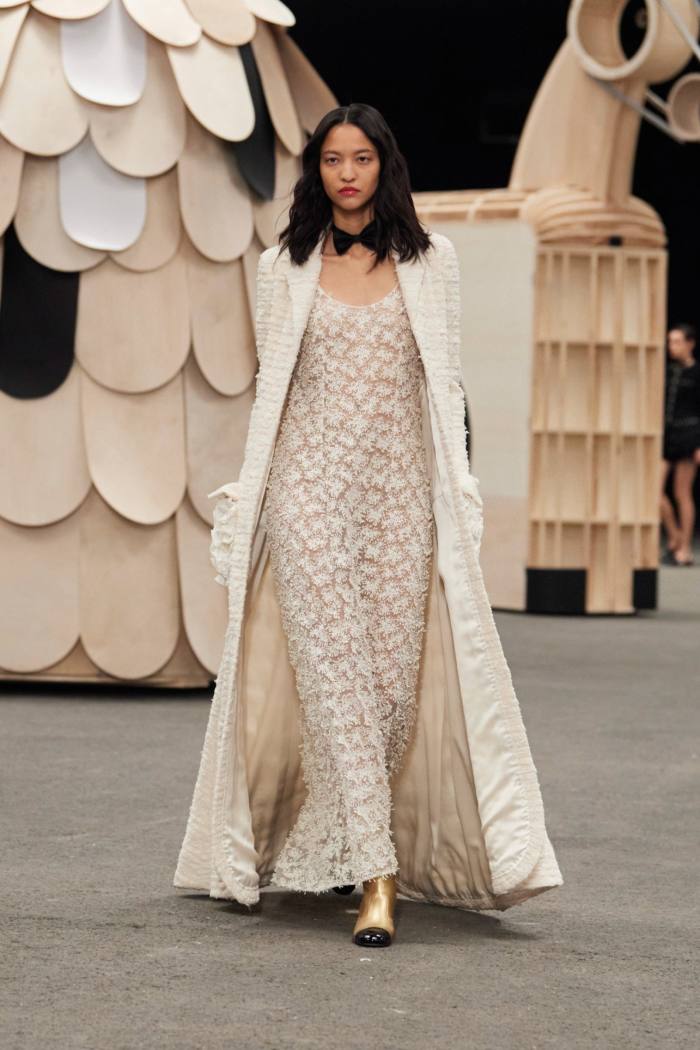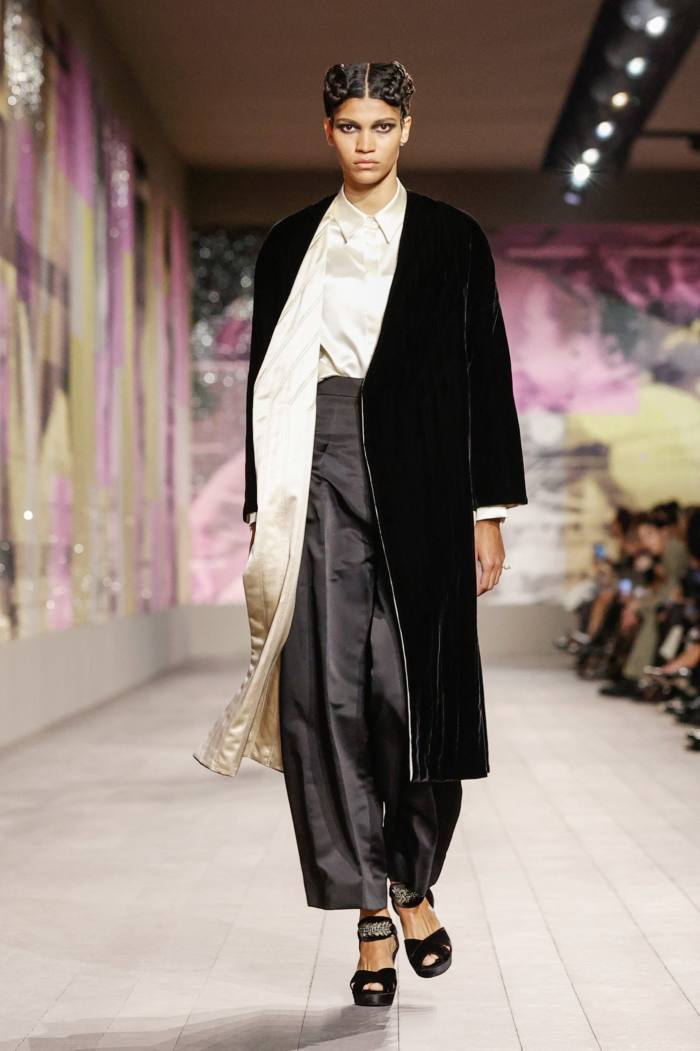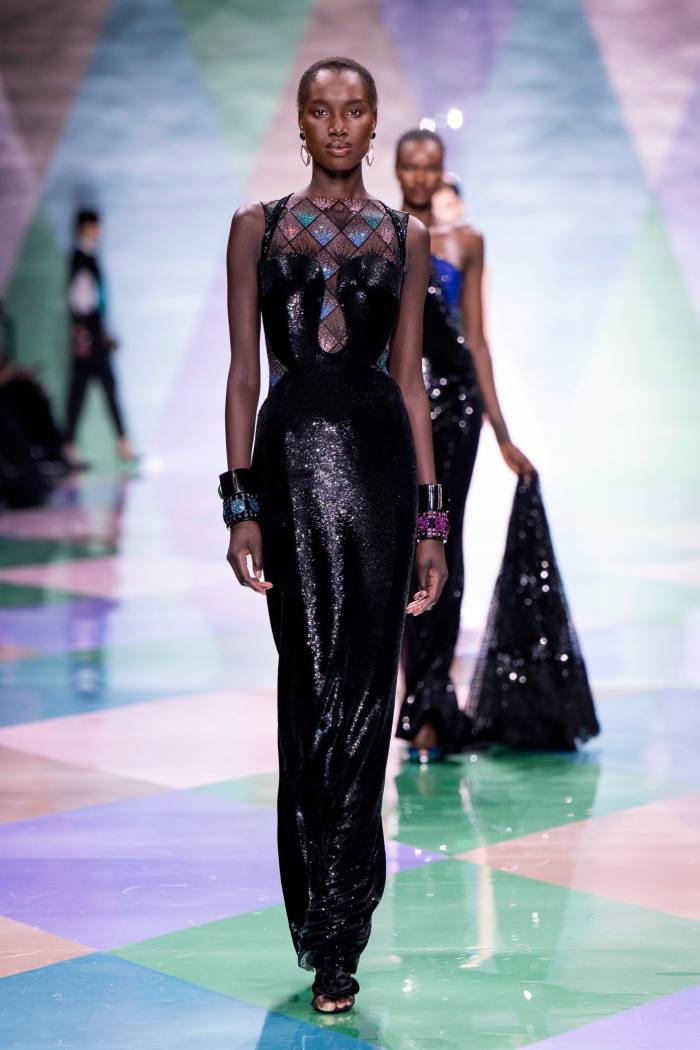In the ornate mirrored ballroom of InterContinental’s Le Grand hotel in Paris on a Wednesday afternoon, a model wearing stilettos and a ballgown that ascended from her hips up towards the ceiling, shrouding her face, made small, uncertain steps into the carpeted show space. Offstage, a producer directed her to turn left, then right, via a microphone sheathed audibly within the gown.
Welcome to the topsy-turvy world of haute couture. The show was by Viktor Horsting and Rolf Snoeren, the Amsterdam-based duo behind OTB-owned Viktor & Rolf. They like to poke a bit of fun at the ultra-serious, ultra-exclusive world of haute couture, where a one-of-a-kind skirt suit can cost upwards of €40,000 and an evening dress several times that (and is available to purchase only after a client has dropped a significant amount on bags and ready-to-wear).
The pair described this collection, titled “Late Stage Capitalism Waltz”, as “an absurd take on a stereotypical couture ballgown for the 21st century”. And it was absurd, with flouncy pastel dresses of chiffon and tulle attached to the models’ bodies at various angles, sometimes in front, sometimes at a 45-degree tilt, at other times intersecting the body at 90 degrees, revealing the flesh-coloured corsetry underneath.




They aren’t dresses you’d wear out to dinner, and it doesn’t matter. Horsting and Snoeren are free of the strategic demands faced by most other designers showing this week — their bestselling Flowerbomb fragrance has been so successful that they were able to shut down their ready-to-wear line in 2015, leaving them free to dream up collections that need not appeal to Hollywood stylists or wealthy individuals in search of an evening frock (their biggest clients, they say, are museums). And the dresses were technically a marvel, able to repel gravity with 3D-printed structures crafted with the help of Hans Boodt Mannequins.
Unserious though it may have been, the collection tapped into the deeper themes at play at Haute Couture Week: of the duality of performer and performance, of representation and artifice. Much of the discussion in the front rows — and online — centred on the real-looking animals Daniel Roseberry conceived for Schiaparelli, which raised important ethical questions about the ways animals are used and represented in fashion.
It kicked off when Kylie Jenner arrived at the Schiaparelli show dressed in a long, narrow black bustier dress affixed with a lion’s head. The head was startlingly lifelike, sculpted from resin and embroidered with faux fur, in a technique that Roseberry described in a studio preview as “faux taxidermy”.
It was employed in three of the looks in the show that followed — a strapless sheath moulded into the form of a spotted leopard with its teeth bared, a one-shouldered black velvet dress with a roaring lion’s head, a shaggy coat with a sentinel she-wolf face on its shoulder — to represent the three animals of Dante’s Inferno, which Roseberry had recently reread.
He had been struck, he wrote in the show notes, by the narrator’s fear of having arrived at middle age and realising “how little he actually knows” — and so he made his show a “homage to doubt”.




But such subtle references are lost on Instagram, where Jenner and the other faux taxidermy looks were widely condemned (and often mistaken for the real thing). The usually tame fashion press criticised it too, for glamorising safaris and the hunting of wild animals.
(In contrast, no such outrage was stirred by the two gold-inlaid handbags stitched from real alligator that also appeared in the show — nor for the copious amounts of feathers, lambskin and calfskin that appeared at other shows, which did involve real animal suffering and were therefore more deserving of censure.)
It’s a shame because the collection was beautifully finished and full of surprises that riffed on couture archetypes and the house’s longstanding associations with artifice and surrealism: dresses with shield-like bodices moulded in undulating waves of mother of pearl and panels of lemon tree wood; an hourglass-shaped bustier top and skirt that shivered with row upon row of tiny pieces of leather-wrapped tin; a 1940s-ish suit paired with an enormous bronze mask (a reference to the giants Dante encounters in the ninth circle of hell).
Animals also took centre stage at Chanel, where guests were greeted by plywood sculptures of a lion, crocodile and an elephant designed by French installation artist Xavier Veilhan, out of which models later emerged, Trojan horse-style, in the hats and bow ties of circus ringmasters. It was an odd twist on a theme inspired by the lion bronzes and coromandel screens painted with exotic birds with which Coco Chanel furnished her Rue Cambon apartment, not least because of circuses’ problematic history of coercing wild animals to perform “tricks”. But again, no outrage here.
The sculptures were toylike and the clothes seemed made for the children who would play with them — little pastel tweed jackets with short ruffled sleeves paired with even littler matching shorts or pleated skirts, and cap-toe boots that laced midway up the calf. They made their wearers look very young. The longer dresses, with their ankle-grazing coats, were more grown up — easy and airy and hanging loosely from the shoulders. It is these relaxed, unrestrictive clothes that best capture the spirit of Chanel’s founder.




Since she began at Dior six-and-a-half years ago, Maria Grazia Chiuri has relaxed many of the sharp lines and waspish waists favoured by her predecessors — even the Bar-jacketed skirt suits had an inviting boxiness in this collection. Josephine Baker was the muse — a woman who bought pieces from Christian Dior and “understood immediately the power of fashion”, Chiuri said. Baker’s sophisticated understanding translated to the clothes, which borrowed more from the softly moulded tailoring Baker favoured in her later years than the revealing frocks of her early stage career.
Such sophistication was missing at Valentino, where the melange of ruffles, polka dots, big bows, shirts with ties, and skirts too brief to sit down in looked more parody than pastiche. But that might simply have been the unfortunate result of its nightclub inspiration. The show did feel like an “event”, held under the bridge of the Port des Champs-Élysées with Anne Hathaway and her husband intertwined on the front row.
Though beautiful at times, with its harlequin-panelled sequin dresses and bejewelled jackets in iridescent colours, Giorgio Armani’s collection suffered from too much repetition — the harlequin pattern appeared over and over, without becoming abstract or taking on any fresh meaning.




And then there was Haider Ackermann’s masterful guest collection for Jean Paul Gaultier, where the actor Timothée Chalamet — whose daring, gender-flouting red carpet persona Ackermann has helped architect — made a rare front row appearance. Since Gaultier himself retired from haute couture in early 2020, his namesake company has invited a rotating cast of creative directors to design haute couture collections in his place — and it has worked surprisingly well.
Ackermann and Gaultier sit at the opposite ends of the style spectrum — one known for his artful draping and austere tailoring, the other for camp. Through Ackermann’s lens, Gaultier signatures — the bustier dress, safety pins, seatbelt straps, the conical brassiere famously worn by Madonna — became simplified, reduced almost to polygons, as if they had been sketched while squinting at past Gaultier creations. There were tributes to other designers too, most notably to Madame Grès, her signature pleats worked into bustier dresses and suits, and to Cristobal Balenciaga, his influence unmistakable in a diamond-shaped violet dress that appeared to be all of a piece.
The guest designership only lasts one season — but here I was left wanting for an encore.


Lauren Indvik is the FT’s fashion editor
Find out about our latest stories first — follow @financialtimesfashion on Instagram
Stay connected with us on social media platform for instant update click here to join our Twitter, & Facebook
We are now on Telegram. Click here to join our channel (@TechiUpdate) and stay updated with the latest Technology headlines.
For all the latest Fashion News Click Here

